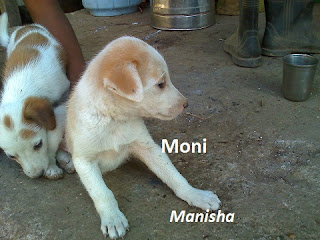Vomiting is common problem in dogs and cats. There are many different causes of it.
Causes :Primary
or gastric causes of vomiting due to diseases of stomach. Secondary or
non-gastric causes of vomiting are Anatomy (body structure of an animal)
of the digestive system of dog/cat. If food is
present in vomit, it is partially digested. If the vomit contains blood
it may be
fresh, red blood or some times it look like coffee grounds if the blood
is digested. Blood
is most often seen with kidney failure,stomach cancer,stomach ulcers.
Vomiting
in dog/cat may occurs after eating or may occur in who is off food.
Vomiting is can be caused by infection, infection of canine feline
panleukopenia virus, canine parvovirus, canine distemper, corona virus,
diabetes, brain disease, cough infection, garbage ingestion, toxins,
medication infections, etc.
A sudden vomiting is can be caused by diet change. Vomiting in dog/cat may occurs after eating or may occur in who is off food.
So at some time or another, chances are an animal will vomit.Vomiting
problem can be confused.It have a wide range of causes so determining the correct one may be complicated.
Symptoms :
Retching,
Weakness, bloated, pain and distress, loss of appetite, depression,
anemia, pale gums, swollen abdomen,dehydration, black and tarry stools,
some times fever, etc.
Diagnosis :
History and physical exam, blood tests, chemistry panel, radiography, intestinal
biopsy, urinalysis, complete blood count, endoscopy, etc. That veterinary doctor will suggest after examination.
The
occasional episode of vomit is normal, may not be an indication of a
serious illness but remember don't take it lightly also.
Treatments :
Treatment will be recommended according to the underlying cause behind the vomiting.
Withhold food as needed the switch to diet without the offending ingredient, low fat diet, antibiotics depending on cause, intravenous fluids if dehydrated, antibiotics to prevent secondary bacterial infections,surgery dependings upon the cause, multiple treatments with appropriate wormer, restrict oral intakes, pain killer as needed, medications to control vomiting, medications to help protect the stomach and increase movement of food out of stomach, etc.
All treatments depend on the cause of vomiting.
The
physical examination of the vomiting dog/cat will provide information
to narrow the list of possible causes. Always follow the
recommended treatment plan from your veterinarian. Remember one thing,
do not experiment with medications or food. Pay close attention to
animal and if it does not improve, take it to veterinarian for a
follow-up treatment plan which is recommended by him. By carefully
watching dog/cat or your pet, you may be able to spot a potential
problem before it comes an
emergency, and save animal from a heartbreaking situation.
Take care of not only your pet but also all stray dogs/cats/animals/birds and prove you are a genuine
animal lover and a responsible human being who respects and care for other living beings.
Always remember, treat animal by experienced and qualified veterinary doctor.







